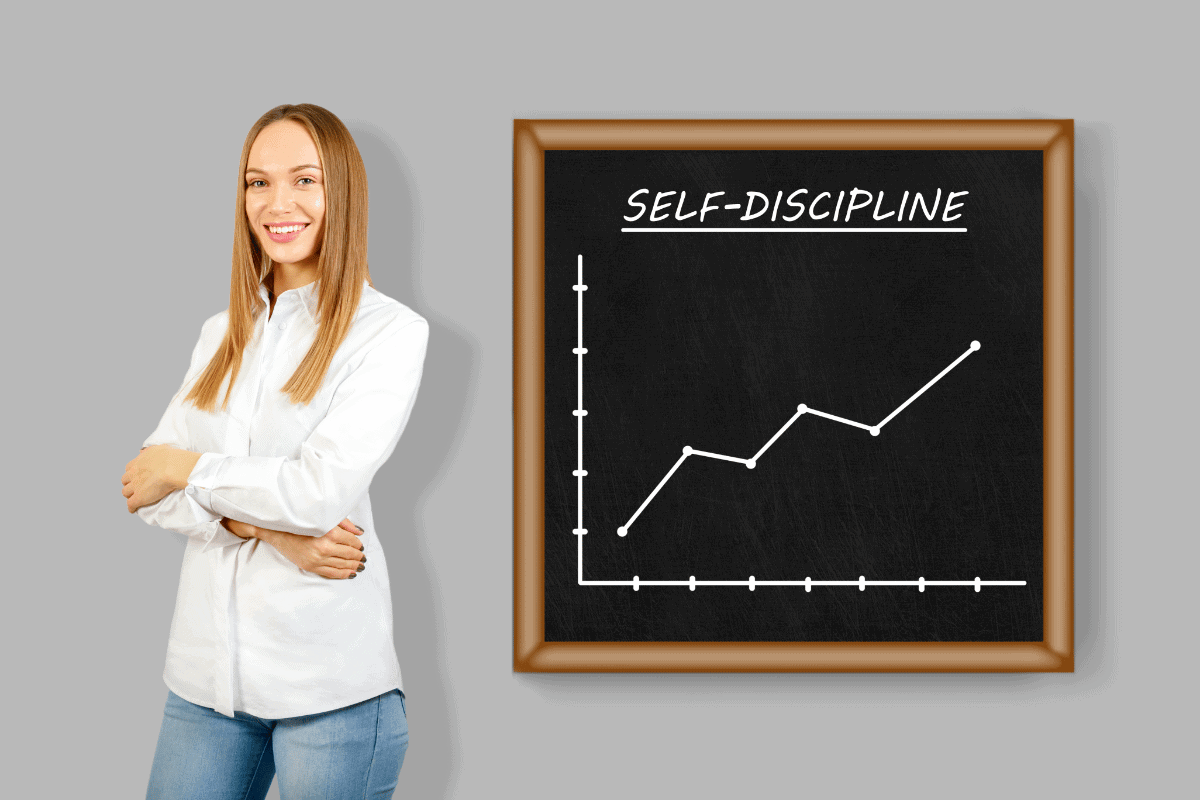Unpacking The Concept Of Self-Discipline
|
Getting your Trinity Audio player ready...
|
Are you struggling to stay focused and accomplish your goals? Do you find yourself easily giving in to distractions or procrastination? If so, then understanding the concept of self-discipline may be the key to unlocking your potential.
Self-discipline is not just about forcing yourself to do something; it is a skill that can be developed and honed over time. By unpacking the concept of self-discipline, you can gain a deeper understanding of what it means and how it can positively impact various aspects of your life.
Self-discipline begins with self-awareness. It is important to understand your strengths, weaknesses, and triggers that may lead to unproductive behaviors. By being aware of these factors, you can make conscious decisions to avoid situations that may hinder your progress.
Additionally, setting clear goals and priorities helps guide your actions towards what truly matters most to you. When you have a clear vision of what you want to achieve, it becomes easier to stay motivated and disciplined in pursuing those goals.
Developing willpower and resilience are also crucial components of self-discipline. Willpower is the ability to resist temptation or delay gratification for long-term benefits. It requires mental strength and determination to overcome instant gratification in favor of achieving greater rewards in the future. Resilience, on the other hand, refers to bouncing back from setbacks or failures without losing motivation or focus. Cultivating these qualities allows you to stay persistent even when faced with challenges along your journey towards success.
Creating effective habits and routines plays a significant role in maintaining self-discipline as well. By establishing positive habits that align with your goals, such as consistent exercise or dedicated study time, these actions become automatic rather than requiring constant motivation or willpower. Routines provide structure and eliminate decision fatigue by allowing certain tasks to become habitualized over time.
Overcoming procrastination and distractions is another critical aspect of self-discipline. Procrastination often stems from fear of failure or perfectionism, causing individuals to delay taking action. By recognizing and addressing these underlying factors, you can develop strategies to overcome procrastination and increase productivity. Similarly, avoiding distractions such as social media or excessive multitasking helps maintain focus and discipline.
In this article, we will explore each of these aspects in depth, providing evidence-based insights and practical tips for developing self-discipline. By understanding the concept of self-discipline and implementing effective strategies, you can ultimately unlock your full potential and achieve the success you desire in various areas of your life.
So let’s dive in.
The Importance of Self-Awareness
You need to be fully aware of your own thoughts and actions in order to truly understand the importance of self-discipline. Self-discipline isn’t just about controlling your behavior; it requires a deep level of self-reflection and mindfulness.
By being aware of your thoughts, emotions, and behaviors, you can gain insight into why you act the way you do and make conscious choices that align with your goals.
Self-reflection is a powerful tool for developing self-discipline because it allows you to examine your patterns and habits objectively. When you take the time to reflect on your actions, you can identify any negative or destructive behaviors that may be hindering your progress.
For example, if you notice that you often procrastinate when faced with a challenging task, self-reflection can help you uncover the underlying reasons behind this behavior, such as fear of failure or a lack of confidence. Once these factors are identified, you can work on addressing them and developing strategies to overcome them.
Mindfulness is another key aspect of self-discipline. It involves being present in the moment and paying attention to your thoughts, emotions, and physical sensations without judgment. By practicing mindfulness regularly, you can become more attuned to your internal experiences and catch yourself before engaging in impulsive or unhealthy behaviors.
For instance, if you’re mindful during a craving for unhealthy food, you may notice the triggers that lead to this desire and choose a healthier alternative instead.
Self-awareness plays a crucial role in understanding the importance of self-discipline. Through self-reflection and mindfulness practices like meditation or journaling, we can gain insight into our own thoughts and behaviors.
This awareness allows us to identify negative patterns or habits that hinder our progress towards our goals. By cultivating self-awareness, we empower ourselves to make conscious choices aligned with our desired outcomes and develop strong self-discipline skills.
Setting Clear Goals and Priorities
Start by clearly defining your goals and priorities, making sure they align with your values and aspirations. Setting clear goals and priorities is essential for practicing self-discipline. By knowing what you want to achieve and what matters most to you, you can better allocate your time and focus on the tasks that will bring you closer to your objectives. Without a clear direction, it’s easy to get distracted or overwhelmed, leading to a lack of discipline.
Time management plays a crucial role in maintaining self-discipline. Once you have defined your goals, it’s important to create a schedule or plan that allows you to effectively manage your time. Prioritize the tasks that are directly related to your goals and eliminate or delegate those that do not contribute significantly. By allocating specific time slots for different activities, you can avoid procrastination and stay on track.
Staying focused is another key aspect of self-discipline when working towards your goals. Avoid multitasking as it often leads to decreased productivity and diluted efforts. Instead, concentrate on one task at a time until completion before moving on to the next one. Minimize distractions by creating an environment conducive to concentration – turn off notifications on your devices, find a quiet space where interruptions are limited, or use noise-canceling headphones if needed.
Setting clear goals and priorities is crucial for practicing self-discipline effectively. Time management helps ensure that you allocate sufficient time for tasks aligned with your goals while staying focused allows you to make the most out of each activity without succumbing to distractions. By incorporating these strategies into your daily routine, you can enhance your self-discipline and increase the likelihood of achieving success in various aspects of life.
Developing Willpower and Resilience
Developing willpower and resilience is like building a sturdy bridge that can withstand the strongest of storms, allowing you to stay focused on your goals and bounce back from setbacks. Willpower refers to the ability to resist short-term temptations in order to achieve long-term goals. It is like a mental muscle that can be trained and strengthened over time. Research has shown that individuals with higher levels of willpower are more likely to achieve their goals and lead successful lives.
To build mental toughness and cultivate a disciplined mindset, it is important to understand the power of habits. Habits are automatic behaviors that we perform without conscious thought. By creating positive habits aligned with our goals, we can reduce the reliance on willpower alone. For example, if your goal is to exercise regularly, you can start by setting a specific time each day for your workout and gradually make it a habit. Over time, exercising will become second nature, requiring less effort and willpower.
Another effective way to develop willpower and resilience is through self-reflection and self-awareness. Take some time each day to reflect on your actions, thoughts, and emotions. Identify any patterns or triggers that may hinder your progress towards your goals. By understanding yourself better, you can anticipate challenges and develop strategies to overcome them. Additionally, practicing mindfulness techniques such as deep breathing or meditation can help increase focus and reduce stress levels, which in turn strengthens your willpower.
The table below summarizes key strategies for developing willpower:
| Strategies for Developing Willpower |
|---|
| Set clear goals |
| Create positive habits |
| Practice self-reflection |
| Manage stress effectively |
| Seek support from others |
By incorporating these strategies into your daily routine, you can gradually build mental toughness and cultivate a discipline mindset necessary for achieving success in various aspects of life. Remember that developing willpower takes time and effort but with persistence, you can strengthen this vital skill set that will empower you to stay focused on your goals and bounce back from any setbacks that come your way.
Creating Effective Habits and Routines
Creating effective habits and routines is crucial for achieving long-term goals. Research has shown that individuals with established routines are 50% more likely to reach their objectives compared to those without consistent habits.
By establishing accountability partnerships, you can enhance your ability to maintain consistency and stay on track towards your desired outcomes.
One effective way to create successful habits and routines is by finding an accountability partner. This can be a friend, family member, or colleague who shares similar goals or objectives. The purpose of this partnership is to hold each other accountable for sticking to the established routines and habits.
By regularly checking in with your accountability partner, you can discuss progress, challenges, and provide support to one another. This helps in staying motivated and committed to following through with the necessary actions needed for success.
Consistency is key when it comes to building effective habits and routines. It’s important to identify specific actions or behaviors that align with your goals and integrate them into your daily schedule. For example, if your goal is to improve physical fitness, establishing a routine of exercising for a certain amount of time each day can be highly beneficial. Consistently following through with this habit will not only improve your physical wellbeing but also strengthen your self-discipline over time.
Creating effective habits and routines plays a vital role in achieving long-term goals. By establishing accountability partnerships and maintaining consistency in our actions, we increase our likelihood of success significantly. Remember that Rome wasn’t built in a day – it takes time and effort to develop these habits but the rewards are worth it in the end.
So start today by identifying the right partner(s) for accountability and integrating the necessary actions into your daily routine – you’ll be on track towards reaching those objectives before you know it!
Overcoming Procrastination and Distractions
By conquering procrastination and eliminating distractions, you can finally break free from the chains that hold you back and unleash your full potential.
Procrastination is the act of delaying or postponing tasks, often resulting in wasted time and increased stress levels. To overcome this common obstacle, effective time management techniques are essential. By prioritizing tasks, setting deadlines, and breaking larger projects into smaller, manageable chunks, you can increase productivity and reduce the likelihood of procrastinating.
One helpful strategy to combat procrastination is practicing mindfulness techniques. Mindfulness involves being fully present in the moment and aware of your thoughts, feelings, and surroundings without judgment. By incorporating mindfulness into your daily routine, you can improve focus and concentration on the task at hand. Taking short breaks throughout the day to engage in activities such as deep breathing exercises or meditation can help clear your mind of distractions and enhance mental clarity.
In addition to time management strategies and mindfulness techniques, it’s important to identify and eliminate potential distractions that may hinder productivity. Distractions come in various forms including social media notifications, emails, or even interruptions from colleagues or family members. To minimize these distractions, consider turning off notifications on your devices during work hours or designating specific times for checking emails or engaging with social media platforms. Creating a dedicated workspace free from unnecessary clutter or noise can also contribute to a more focused environment conducive to completing tasks efficiently.
Overall, by implementing effective time management techniques along with incorporating mindfulness practices into your routine while eliminating distractions that hinder productivity, you’ll be able to overcome procrastination effectively. Breaking free from these barriers allows you to make the most of your time by enhancing focus and concentration on important tasks at hand. With commitment and consistency in applying these strategies, you’ll find yourself achieving higher levels of productivity while unleashing your full potential.
Conclusion
In conclusion, self-discipline is a crucial aspect of personal growth and success. By developing a strong sense of self-awareness, setting clear goals, and prioritizing effectively, you can harness the power of your willpower and resilience to overcome challenges.
Additionally, creating effective habits and routines will help you stay on track towards achieving your objectives.
Ironically, while self-discipline requires avoiding procrastination and distractions, it also allows for freedom and flexibility in your daily life. By implementing discipline into your routine, you’re enabling yourself to make more intentional choices and ultimately have more control over your own actions. This level of autonomy can lead to increased productivity and fulfillment in all areas of life.
Furthermore, research has shown that individuals with higher levels of self-discipline tend to have better mental health outcomes. Through the practice of self-control, individuals can manage stress more effectively and maintain a positive mindset even in challenging situations. The evidence-based benefits of self-discipline extend beyond just accomplishing tasks; they encompass overall well-being.
To summarize, self-discipline isn’t just about restraining yourself from indulgences or succumbing to distractions – it’s about making conscious decisions that align with your values and goals. It may seem paradoxical that by imposing structure on ourselves we gain freedom, but through this process, we unlock our true potential. So embrace the concept of self-discipline as a powerful tool for personal growth – it might just be the key to unlocking a more fulfilling and successful future.








